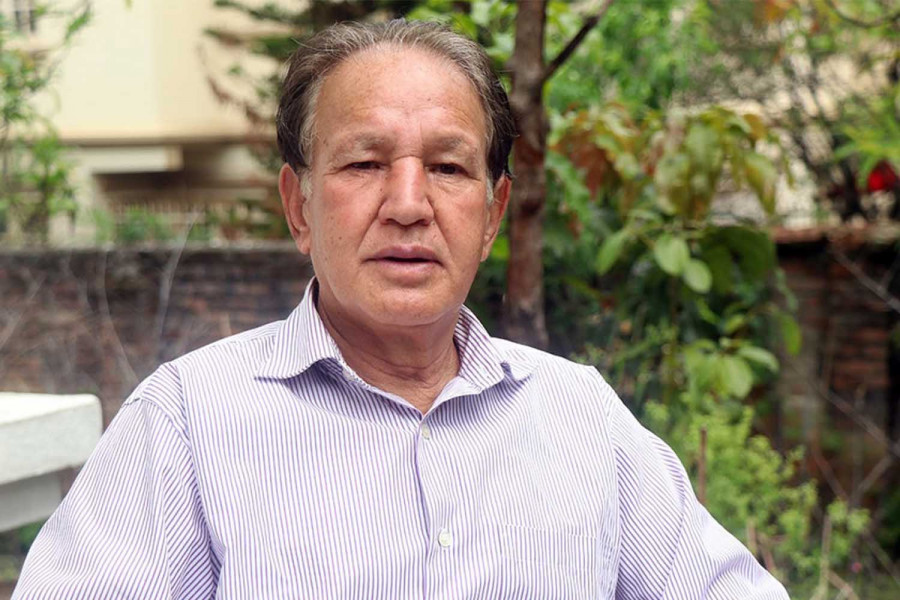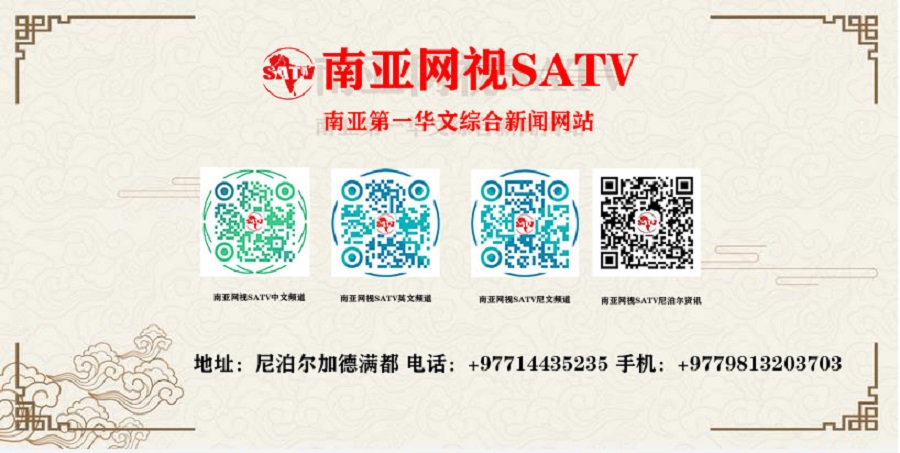
Four government secretaries from Foreign, Home, Commerce and Physical Infrastructure ministries and one joint secretary from the Ministry of Finance will accompany Khadka, who will be joined by Nepal’s ambassador to China Bishnu Pukar Shrestha.
Foreign Minister Narayan Khadka is leaving for Qingdao, China on Tuesday night, just as Beijing and Washington continue to spar over Taiwan following US House Speaker Nancy Pelosi’s visit to the self-ruled island last week.
Leading an 11-member delegation, Khadka will directly land in Qingdao, a coastal city, at the invitation of his Chinese counterpart, Wang Yi, who is also the state councilor.
The Chinese side has arranged a chartered flight for Khadka and his delegation from Kathmandu to Qingdao and Qingdao to Kathmandu, sources said.
Officials said that the visit, which is taking place amid heightened tensions between China and the US over the Taiwan Strait, has attracted concerns from a section of the diplomatic community and that they have conveyed their “displeasure” to the Nepali side at the highest level.
Broadly, the Americans have expressed their displeasure over Khadka’s visit to China, according to officials.
Beijing has been seeking to shore up support from countries around the world following Pelosi’s visit to Taiwan.
According to the Global Times, a Chinese government mouthpiece, 160 plus countries, accounting for 80 percent of world’s population, have reiterated their commitment to the one-China policy “after Pelosi’s provocative visit to Taiwan.”
China considers the island part of its territory and has condemned Pelosi’s visit as a violation of the one-China policy, which the US too vouches for. The Chinese embassy in Kathmandu while chiding Pelosi's visit to Taiwan in a statement had said last week that China believes Nepal will abide by its commitment to the one-China policy.
Nepal has time again, and only last week also, reiterated its commitment to the one-China policy.
Asked to respond to America’s concerns over Khadka’s planned visit to China, the US Embassy spokesperson, Anna Richey-Allen, told the Post: “As you know, as a matter of long-standing diplomatic code and policy, the US government does not release content of private diplomatic conversations.”
According to knowledgeable sources, the US side expressed its displeasure with senior government officials after the Foreign Ministry announced Khadka’s visit to China on August 5.
“The United States understands Nepal adheres to the one-China policy, as does the United States,” said Allen in an email response to the Post. “We’d note the United States has an abiding interest in peace and stability across the Taiwan Strait and opposes any unilateral efforts to change the status quo, especially by force.”
The US embassy also expressed concerns about missiles fired by China into waters surrounding Taiwan in the aftermath of Pelosi’s visit.
“We are deeply concerned by the People’s Republic of China’s (PRC) decision to launch an estimated 11 ballistic missiles towards Taiwan,” the spokesperson said. “Japan reported that five of those missiles landed in its Exclusive Economic Zone, and some of which directly overflew Taiwan in an unprecedented move.”
Nepal shares decades of diplomatic ties with both China and the US. Both are lately competing to renew their engagements in Nepal, as both want to keep each other in check when it comes to the Himalayan nation.
One senior foreign ministry official said that Khadka’s visit was scheduled much before the tension arose over the Taiwan Strait.
“The South Korean foreign minister is also visiting China just ahead of ours. South Korea is known as a strong ally of the US so there is nothing wrong in visiting China because we have already made our position public. The visit is aimed at reaffirming our bilateral ties, not to take sides,” the official said.
Though the Chinese embassy had extended an invitation to Khadka to visit China on July 29, the Foreign Ministry announced the visit on August 5.
The same day Foreign Ministry spokesperson Sewa Lamsal said that Nepal was closely following the evolving situation in the Taiwan Strait.
“Nepal has always been upholding the one-China Policy. Both Nepal and China have been respecting each other's sovereignty, territorial integrity, and national independence. As a peace-loving country, Nepal is in favour of continued peace and stability in the region,” said Lamasal during a regular press briefing. The same statement was later posted by the foreign ministry on Twitter.
Four government secretaries from Foreign, Home, Commerce and Physical Infrastructure ministries and one joint secretary from the Ministry of Finance will accompany Khadka, who will be joined by Nepal’s ambassador to China Bishnu Pukar Shrestha.
Some understandings will be signed during the visit. Officials said those understandings will be announced after bilateral talks between Khadka and Wang on Wednesday.
“Our focus will be on the implementation of the past accords reached between two sides during several occasions. Most importantly Nepal will seek to know the progress on the status of the 600 million RMB grant pledged during the visit of Chinese President Xi Jinping to Nepal in 2019 and some projects under the grant,” said a Foreign Ministry official familiar with the visit.
During official level talks between President Bidya Devi Bhandari and Chinese President Xi in October 2019, the latter had announced a Rs56 billion grant to Nepal for two years but both sides failed to negotiate on how to utilize the amount in the wake of the Covid-19 pandemic.
But the grant was not mentioned in a joint communiqué issued at the end of Xi’s visit.
The Chinese side, during the visit of foreign minister Wang to Nepal in March this year, had assured that they will release the grant as soon as possible, according to two officials.
“It has already been five months so we are looking for an early release of the grant,” said another official familiar with the matter.
The Nepali side is considering using the fund to construct a 32km long tunnel—from Tokha in Kathmandu to Chhahare in Nuwakot. The plan is to connect the tunnel by an access road connecting it to Galchhi-Syaphrubeshi road which will cost around Rs26.5 billion, according to sources.
Any projects that will be discussed during the visit will not be under the Belt and Road Initiative but will be those which have been agreed upon and promised in the past, said officials.
One senior official said no major agreements or pacts will be signed during the visit as elections have already been announced in Nepal for November 20.
Shrestha, the Nepali ambassador to China, told the Post over the phone from Beijing that they have not received the agenda from Kathmandu but discussions will focus on cross-border connectivity, resumption of Nepali exports to China that have been halted since the pandemic and increasing the number of flights between Nepal and China, among others.
“Our minister is paying a visit at a very crucial time so we are expecting some good gestures from the Chinese side,” said Shrestha. “I don’t think any substantive progress on the BRI because our priority is on grants.”
Those who follow international relations said that the main thrust of the visit is to reaffirm Nepal’s position, build confidence and seek more partnership on the economic cooperation front.
“Besides reiterating our position on one-China policy, the visit should focus on strengthening bilateral ties rather than focusing on larger issues,” said Dinesh Bhattarai, who served as foreign relations adviser to two prime ministers in the past. “We have several pending issues with China which were agreed upon in the past.”
According to Bhattarai, since the time of the visit is interesting given the developing contexts, the Chinese will definitely seek a renewed commitment to Nepal’s one-China policy.
“It would be better on our part to focus on the implementation of past agreements rather than making statements on larger issues, including geopolitical matters,” Bhattarai told the Post. “It’s natural for our neighbours—be it China or India—to seek affirmation that their interests won’t be harmed.”
Some sections in Nepal have been accusing the Sher Bahadur Deuba government of tilting towards the West and the Chinese too appear to believe that following the ratification of the Millennium Challenge Corporation Nepal Compact, a $500 million US grant for Nepal.
China had vocally opposed the MCC compact, even chiding the US for what it called “coercive diplomacy.”
Nepal’s vote in favour of Ukraine at the United Nations after the Russian invasion of the east European country was also seen by some as a move made at the behest of the West, especially America. The Americans had hailed Nepal’s vote against the Russian invasion of Ukraine.
“The Chinese are looking for Nepal’s firm support on the Taiwan issue and probably Khadka will reaffirm our position,” said Sundar Nath Bhattarai, chairman of the China Study Centre. “Since China is our irreversible friend and it has always been supportive to us, the visit in the midst of tensions over the Taiwan Strait is also a good opportunity for us to show our firm commitment. The visit will help build confidence so I am expecting a positive outcome.”













